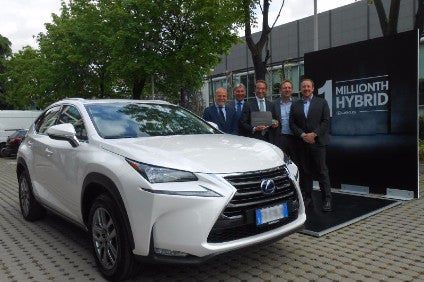
After a large increase in European new car registrations in December 2019, volume decreased in January 2020 but EVs soared.
JATO Dynamics analysis of EU27 markets said 1,138,057 new passenger cars were registered in January 2020, a decline of 7.6% from January 2019.

Discover B2B Marketing That Performs
Combine business intelligence and editorial excellence to reach engaged professionals across 36 leading media platforms.
This steep reduction was in large part caused by the last minute purchases made in December, due to the impending introduction of the new CO2 emissions regulation.
Despite the decrease from December, registration levels were the fourth largest for any January in the last decade.
Global analyst Felipe Munoz said: “The European market is still showing signs of strength despite a tough environment. We believe that the market is capable of adapting to meet new regulations and impending challenges. This is exemplified by the increase of EV registrations, which was a lifeline for many OEMs in January. Only two years ago not many in the industry would have predicted such high levels of demand for EVs.”
Electrified vehicles were the only driver of growth for the market in January. They posted a record in volume and market share due to increasing incentives for consumers, greater awareness about the benefits of electrified vehicles and the growing concern about diesel and petrol cars. During the first month of 2020, total EV registrations increased by a huge 72%, jumping from 87,100 units posted in January 2019 to 150,100 units in the same month of 2020. This is a market share of 13.3% compared to just 7.1% in the year prior.
All EV types contributed to growth as hybrids (HEV) increased volume by 36%, pure electric (BEV) by 91% and plug-in hybrids (PHEV) by 173%.
For the first time, the hybrids counted for less than half of total EV registrations.
Munoz : “Europe demonstrated that the widespread adoption of EVs is increasingly feasible, and will become a likely reality once the cars become more affordable”.
The penetration of EVs in each market highlights the outstanding performance of these vehicles. They made up 77% of total car registrations in Norway, 38% in Sweden and 28% in Finland. Among the big markets, EVs counted for almost 19% in France, 14% in the UK, 12% in Spain, 10% in Germany and 8% in Italy.
By brand, these cars represented an important part of the volume registered by Smart (96%), Lexus and Toyota (95% and 66% respectively), DS (42%), Suzuki (41%) and Land Rover (37%). In contrast to this, they made up a significantly smaller proportion of the volume by registered by Citroen (1.4%), Seat (1.4%), Ford (3.3%), Opel (3.9%), Skoda (4%) and Volkswagen (5%).
Despite a slight decrease in total registrations SUVs did manage to increase market share due to the drop in overall vehicle sales in January. Across Europe consumers bought 452,900 SUVs, down by only 1%, which allowed them to gain 2.6 points of share at 39.8% of total registrations. Only 14% of all SUV registrations in January were powered by electrified engines, whereas 28% of luxury sedans were HEV, PHEV or BEV.
Munoz said: “SUVs continue to gain traction. However, manufacturers need to produce more EV models if they want to keep up the momentum of growth moving forward”.
Among the latest launches, the Volkswagen T-Cross registered 12,880 units; the Skoda Kamiq 6,079 units; Ford Puma 6,036 units; Skoda Scala 5,646; Mazda CX-30 5,561; Kia Xceed 3,231; Audi Q3 Sportback 3,080; DS 3 Crossback 2,382; Lexus UX 1,894; Tesla Model 3 1,457 and Toyota Camry 1,182.






